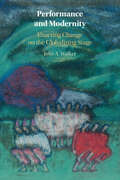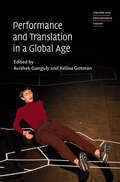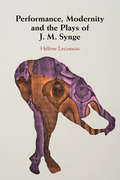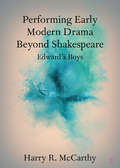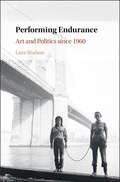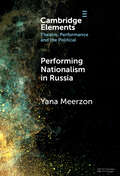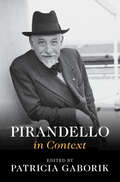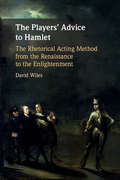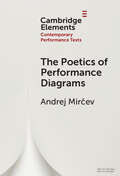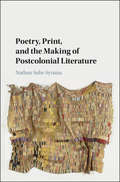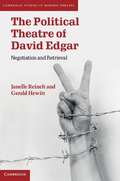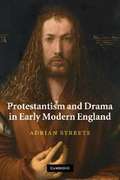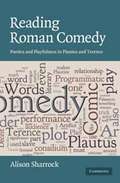- Table View
- List View
Occult Knowledge, Science, and Gender on the Shakespearean Stage
by Mary Floyd-WilsonBelief in spirits, demons and the occult was commonplace in the early modern period, as was the view that these forces could be used to manipulate nature and produce new knowledge. In this ground-breaking study, Mary Floyd-Wilson explores these beliefs in relation to women and scientific knowledge, arguing that the early modern English understood their emotions and behavior to be influenced by hidden sympathies and antipathies in the natural world. Focusing on Twelfth Night, Arden of Faversham, A Warning for Fair Women, All's Well That Ends Well, The Changeling and The Duchess of Malfi, she demonstrates how these plays stage questions about whether women have privileged access to nature's secrets and whether their bodies possess hidden occult qualities. Discussing the relationship between scientific discourse and the occult, she goes on to argue that as experiential evidence gained scientific ground, women's presumed intimacy with nature's secrets was either diminished or demonized.
Paratexts in English Printed Drama to 1642
by Thomas L. Berger Sonia MassaiThe paratexts in early modern English playbooks the materials to be found primarily in their preliminary pages and end matter provide a rich source of information for scholars interested in Shakespeare, Renaissance Drama and the History of the Book. In addition, these materials offer valuable insights into the rise of dramatic authorship in print, early modern attitudes towards theatre, notorious literary wrangles and the production of drama both on the stage and in the printing house. This unique two-volume reference is the first to include all paratextual materials in early modern English playbooks, from the emergence of print drama to the closure of the theatres in 1642. The texts have been transcribed from their original versions and presented in old-spelling. With an introduction, user's guide, multiple indices and a finding list, the editors provide a comprehensive overview of seminal texts which have never before been fully transcribed, annotated and cross-referenced. "
Passionate Playgoing in Early Modern England
by Allison P. HobgoodAllison P. Hobgood tells a new story about the emotional experiences of theatregoers in Renaissance England. Through detailed case studies of canonical plays by Shakespeare, Jonson, Kyd and Heywood, the reader will discover what it felt like to be part of performances in English theatre and appreciate the key role theatregoers played in the life of early modern drama. How were spectators moved - by delight, fear or shame, for example - and how did their own reactions in turn make an impact on stage performances? Addressing these questions and many more, this book discerns not just how theatregoers were altered by drama's affective encounters, but how they were undeniable influences upon those encounters. Overall, Hobgood reveals a unique collaboration between the English world and stage, one that significantly reshapes the ways we watch, read and understand early modern drama.
Performance and Identity in the Classical World
by Anne DuncanActors in the classical world were often viewed as frauds and impostors, capable of deliberately fabricating their identities. Conversely, they were sometimes viewed as possessed by the characters that they played, or as merely playing themselves onstage. Numerous sources reveal an uneasy fascination with actors and acting, from the writings of elite intellectuals (philosophers, orators, biographers, historians) to the abundant theatrical anecdotes that can be read as a body of "popular performance theory. " This study examines these sources, along with dramatic texts and addresses the issue of impersonation, from the late fifth century BCE to the early Roman Empire.
Performance and Modernity: Enacting Change on the Globalizing Stage
by Julia A. WalkerHow do ideas take shape? How do concepts emerge into form? This book argues that they take shape quite literally in the human body, often appearing on stage in new styles of performance. Focusing on the historical period of modernity, Performance and Modernity: Enacting Change on the Globalizing Stage demonstrates how the unforeseen impact of economic, industrial, political, social, and psychological change was registered in bodily metaphors that took shape on stage. In new styles of performance-acting, dance, music, pageantry, avant-garde provocations, film, video and networked media-this book finds fresh evidence for how modernity has been understood and lived, both by stage actors, who, in modelling new habits, gave emerging experiences an epistemological shape, and by their audiences, who, in borrowing the strategies performers enacted, learned to adapt to a modernizing world.
Performance and Translation in a Global Age (Theatre and Performance Theory)
by Avishek Ganguly Kélina GotmanPerformance, Modernity and the Plays of J. M. Synge
by Helene LecossoisIrish Revivalist playwright J. M. Synge is often regarded as a realist. Yet what happens when his work is analysed through wider performance studies and situated alongside less familiar historical contexts? By addressing this question, Hélène Lecossois offers new and valuable perspectives on Synge's plays while at the same time engaging with the complexity of his treatment of a range of performance practices – from keening at rural funerals to the performances of 'native villagers' in the entertainment section of International Exhibitions. What emerges from her study is a dramatist acutely aware of the ability of theatre in performance to counteract relentless forward-moving narratives of modernity. Through detailed, contextualized case studies, the book simultaneously makes meaningful contributions to performance studies and opens up theoretical questions of performance relating to the status of the object on stage, the body on stage and theatrical time.
Performing Early Modern Drama Beyond Shakespeare: Edward's Boys (Elements in Shakespeare Performance)
by Harry McCarthyThis Element provides the first in-depth study of the present-day all-boy company, Edward's Boys, who are based at King Edward VI School ('Shakespeare's School') in Stratford-upon-Avon. Since 2005, the company has produced a wide array of early modern plays, providing the most substantial repertory of early modern drama available for examination by scholars. The Element provides a comprehensive account of the company's practices, drawing on extensive rehearsal and performance observation, evidence from the company's archive, and interviews with actors and key company personnel. The Element takes account of the company's particular educational and strongly interpersonal environment, suggesting that these factors have a distinctive shaping force on their performance practice. In the hands of Edward's Boys, the Element argues, early modern drama becomes the source of company creation, ensemble practice, and virtuosic physical play, inviting us to reimagine what it means – and takes – to perform these plays today.
Performing Endurance: Art and Politics since 1960
by Lara ShalsonIn Performing Endurance, Lara Shalson offers a new way of understanding acts of endurance in art and political contexts. Examining a range of performances from the 1960s to the present, including influential performance art works by Marina Abramović, Chris Burden, Tehching Hsieh, Linda Montano, Yoko Ono, and others, as well as protest actions from the lunch counter sit-ins of the US civil rights movement to protest camps in the twenty-first century, this book provides a formal account of endurance and illuminates its ethical and political significance. Endurance, Shalson argues, raises vital questions about what it means to exist as a body that both acts and is acted upon, from ethical questions about how we respond to the bodies of others to political questions about how we live in relation to institutions that shape life in fundamental ways. In addition, Performing Endurance rethinks how performance itself endures over time.
Performing Greek Comedy
by Alan HughesAlan Hughes presents a new complete account of production methods in Greek comedy. The book summarizes contemporary research and disputes, on such topics as acting techniques, theater buildings, masks and costumes, music and the chorus. Evidence is re-interpreted and traditional doctrine overthrown. Comedy is presented as the pan-Hellenic, visual art of theater, not as Athenian literature. Recent discoveries in visual evidence are used to stimulate significant historical revisions. The author has directly examined 350 vase scenes of comedy in performance and actor-figurines, in 75 collections, from Melbourne to St Petersburg. Their testimony is applied to acting techniques and costumes, and women's participation in comedy and mime. The chapters are arranged by topic, for convenient reference by scholars and students of theater history, literature, classics and drama. Overall, the book provides a fresh practical insight into this continually developing subject.
Performing Nationalism in Russia (Elements in Theatre, Performance and the Political)
by null Yana MeerzonFollowing Homi Bhabha's prompt on reading nationalism as a set of discursive and performative practices, this Element focuses on the cultural geography of today's Russia and examines a range of performative strategies used by the Russian state to uphold its nationalist project. Simultaneously, it maps artistic strategies of resistance to the ideology of nationalism as employed by both state-funded and independent theatre companies, via new dramaturgies, performance practices and strategies of storytelling.
Performing Oaths in Classical Greek Drama
by Judith FletcherOaths were ubiquitous rituals in ancient Athenian legal, commercial, civic and international spheres. Their importance is reflected by the fact that much of surviving Greek drama features a formal oath sworn before the audience. This is the first comprehensive study of that phenomenon. The book explores how the oath can mark or structure a dramatic plot, at times compelling characters like Euripides' Hippolytus to act contrary to their best interests. It demonstrates how dramatic oaths resonate with oath rituals familiar to the Athenian audiences. Aristophanes' Lysistrata and her accomplices, for example, swear an oath that blends protocols of international treaties with priestesses' vows of sexual abstinence. By employing the principles of speech act theory, this book examines how the performative power of the dramatic oath can mirror the status quo, but also disturb categories of gender, social status and civic identity in ways that redistribute and confound social authority.
Performing Orthodox Ritual in Byzantium
by Andrew Walker WhiteIn this groundbreaking, interdisciplinary study, Andrew Walker White explores the origins of Byzantine ritual - the rites of the early Greek Orthodox Church - and its unique relationship with traditional theatre. Tracing the secularization of pagan theatre, the rise of rhetoric as an alternative to acting, as well as the transmission of ancient methods of musical composition into the Byzantine era, White demonstrates how Christian ritual was in effect a post-theatrical performing art, created by intellectuals who were fully aware of traditional theatre but who endeavoured to avoid it. The book explores how Orthodox rites avoid the aesthetic appreciation associated with secular art, and conducts an in-depth study (and reconstruction) of the late Byzantine Service of the Furnace. Often treated as a liturgical drama, White translates and delineates the features of five extant versions, to show how and why it generated widely diverse audience reactions in both medieval times and our own.
Pericles (The New Cambridge Shakespeare)
by William Shakespeare edited by Doreen DelVecchio Antony HammondOver the past two decades there has been a resurgence of theatrical interest in Shakespeare's Pericles, which has been rescued from comparative neglect and is now frequently performed. This development is charted in the introduction to this edition, which differs radically from any other currently available. Doreen DelVecchio and Antony Hammond reject the critical orthodoxies of a corrupt text and divided authorship. Instead they show the play to be a unified aesthetic experience. The result is a more enthusiatic view of Pericles than that of other editions.
The Philosophy of Tragedy
by Julian YoungThis book is a full survey of the philosophy of tragedy from antiquity to the present. From Aristotle to Žižek the focal question has been: why, in spite of its distressing content, do we value tragic drama? What is the nature of the 'tragic effect'? Some philosophers point to a certain kind of pleasure that results from tragedy. Others, while not excluding pleasure, emphasize the knowledge we gain from tragedy – of psychology, ethics, freedom or immortality. Through a critical engagement with these and other philosophers, the book concludes by suggesting an answer to the question of what it is that constitutes tragedy 'in its highest vocation'. This book will be of equal interest to students of philosophy and of literature.
Pirandello in Context (Literature in Context)
by Patricia GaborikFor students of Luigi Pirandello's life and works, this volume provides a multi-faceted view spanning the many genres in which he wrote, from poetry and essays to fiction and drama. It gives a true sense of Pirandello's remarkable sensitivity to place – from his native Sicily to Germany and Latin America – and of how his perspective was shaped by a wide range of interlocutors with varying professional backgrounds, from contemporary philosophers to fellow playwrights like Bernard Shaw, directors like Max Reinhardt and the actress Marta Abba. Diverse contributors explore the sheer genre-bending originality of Pirandello's humor, metatheatre, and fantastic tales, and reveal how profound shifts in society, culture, and politics in his time – Freud, Futurism, Fascism – conditioned not just his thought but also his meteoric rise to fame. A final section is dedicated to Pirandello's legacy in literature and drama throughout the twentieth century and into the twenty-first.
The Players' Advice to Hamlet: The Rhetorical Acting Method from the Renaissance to the Enlightenment
by David WilesHamlet is a characteristic intellectual more inclined to lecture actors about their craft than listen to them, and is a precursor of Enlightenment figures like Diderot and Lessing. This book is a quest for the voice of early professional actors, drawing on English, French and other European sources to distinguish the methods of professionals from the theories of intellectual amateurs. David Wiles challenges the orthodoxy that all serious discussion of acting began with Stanislavski, and outlines the comprehensive but fluid classical system of acting which was for some three hundred years its predecessor. He reveals premodern acting as a branch of rhetoric, which took from antiquity a vocabulary for conversations about the relationship of mind and body, inside and outside, voice and movement. Wiles demonstrates that Roman rhetoric provided the bones of both a resilient theatrical system and a physical art that retains its relevance for the post-Stanislavskian performer.
The Poetics of Performance Diagrams (Elements in Contemporary Performance Texts)
by null Andrej MirčevThis Element considers the concept of performance diagrams and shows their historical, epistemic and aesthetic functions in theatre and dance. In three sections, the author surveys the architectural model of theatre by Vitruvius, the woodcut of Marlow's Doctor Faustus, Aby Warburg's Mnemosyne-Atlas, the spells and drawings of Antonin Artaud, the performance Paradise Now (the Living Theatre) and the choreography I am 1984 (Barbara Matijević). Demonstrating that diagrams can be applied to multiply dramaturgical trajectories, the text reviews their relevance for performance-making, analysis and documentation. The author argues that diagrams provide new tools for theory, practice and archiving, while at the same time enabling reflection on the intersections between poetics and politics. Focusing on the potentiality of diagrams to cut through representation and dichotomies, this Element affirms the visual, corporeal and spatial dimensions of performance-making. In doing so, it elucidates the significance of diagrammatic thinking for performance studies.
Poetry, Print, and the Making of Postcolonial Literature
by Nathan Suhr-SytsmaPoetry, Print, and the Making of Postcolonial Literature reveals an intriguing history of relationships among poets and editors from Ireland and Nigeria, as well as Britain and the Caribbean, during the mid-twentieth-century era of decolonization. The book explores what such leading anglophone poets as Seamus Heaney, Christopher Okigbo, and Derek Walcott had in common: 'peripheral' origins and a desire to address transnational publics without expatriating themselves. The book reconstructs how they gained the imprimatur of both local and London-based cultural institutions. It shows, furthermore, how political crises challenged them to reconsider their poetry's publics. Making substantial use of unpublished archival material, Nathan Suhr-Sytsma examines poems in print, often the pages on which they first appeared, in order to chart the transformation of the anglophone literary world. He argues that these poets' achievements cannot be extricated from the transnational networks through which their poems circulated - and which they in turn remade.
The Political Theatre of David Edgar
by Janelle Reinelt Gerald HewittDavid Edgar's writings address the most basic questions of how humans organize and govern themselves in modern societies. This study brings together the disciplines of political philosophy and theatre studies to approach the leading British playwright as a political writer and a public social critic. Edgar uses theatre as a powerful tool of public discourse, an aesthetic modality for engaging with and thinking/feeling through the most pressing social issues of the day. In this he is a supreme rationalist: he deploys character, plot and language to explore ideas, to make certain kinds of discursive cases and model hypothetical alternatives. Reinelt and Hewitt analyze twelve of Edgar's most important plays, including Maydays and Pentecost and also provide detailed discussions of key performances and critical reception to illustrate the playwright's artistic achievement in relation to his contributions as a public figure in British cultural life.
Pollution and Crisis in Greek Tragedy
by Fabian MeinelPollution is ubiquitous in Greek tragedy: matricidal Orestes seeks purification at Apollo's shrine in Delphi; carrion from Polyneices' unburied corpse fills the altars of Thebes; delirious Phaedra suffers from a 'pollution of the mind'. This book undertakes the first detailed analysis of the important role which pollution and its counterparts - purity and purification - play in tragedy. It argues that pollution is central in the negotiation of tragic crises, fulfilling a diverse array of functions by virtue of its qualities and associations, from making sense of adversity to configuring civic identity in the encounter of self and other. While primarily a literary study providing close readings of several key plays, the book also provides important new perspectives on pollution. It will appeal to a broad range of scholars and students not only in classics and literary studies, but also in the study of religions and anthropology.
Popular Musical Theatre in London and Berlin
by Len Platt Tobias Becker David Linton Len Platt Tobias BeckerIn the decades before the Second World War, popular musical theatre was one of the most influential forms of entertainment. This is the first book to reconstruct early popular musical theatre as a transnational and highly cosmopolitan industry that included everything from revues and operettas to dance halls and cabaret. Bringing together contributors from Britain and Germany, this collection moves beyond national theatre histories to study Anglo-German relations at a period of intense hostility and rivalry. Chapters frame the entertainment zones of London and Berlin against the wider trading routes of cultural transfer, where empire and transatlantic song and dance produced, perhaps for the first time, a genuinely international culture. Exploring adaptations and translations of works under the influence of political propaganda, this collection will be of interest both to musical theatre enthusiasts and to those interested in the wider history of modernism.
Professing Performance
by Shannon JacksonToday's academic discourse is filled with the word 'perform'. Nestled amongst a variety of prefixes and suffixes (re-, post-, -ance, -ivity?), the term functions as a vehicle for a host of contemporary inquiries. For students, artists, and scholars of performance and theatre, this development is intriguing and complex. By examining the history of theatre studies and related institutions and by comparing the very different disciplinary interpretations and developments that led to this engagement, Professing Performance offers ways of placing performance theory and performance studies in context. This 2004 book considers the connection amongst a range of performance forms such as oratory, theatre, dance, and performance art and explores performance as both a humanistic and technical field of education. Throughout, she explores the institutional history of performance in the US academy in order to revise current debates around the role of the arts and humanities in higher education.
Protestantism and Drama in Early Modern England
by Adrian StreeteContaining detailed readings of plays by Shakespeare, Marlowe and Middleton, as well as poetry and prose, this book provides a major historical and critical reassessment of the relationship between early modern Protestantism and drama. Examining the complex and painful shift from late Medieval religious culture to a society dominated by the ideas of the Reformers, Adrian Streete presents a fresh understanding of Reformed theology and the representation of early modern subjectivity. Through close analysis of major thinkers such as Augustine, William of Ockham, Erasmus, Luther and Calvin, the book argues for the profoundly Christological focus of Reformed theology and explores how this manifests itself in early modern drama. Moving beyond questions of authorial 'belief', Streete assesses Elizabethan and Jacobean drama's engagement with the challenges of the Reformation.
Reading Roman Comedy: Poetics and Playfulness in Plautus and Terence
by Alison SharrockFor many years the domain of specialists in early Latin, in complex metres, and in the reconstruction of texts, Roman comedy has only recently begun to establish itself in the mainstream of Classical literary criticism. Where most recent books stress the original performance as the primary location for the encountering of the plays, this book finds the locus of meaning and appreciation in the activity of a reader, albeit one whose manner of reading necessarily involves the imaginative reconstruction of performance. The texts are treated, and celebrated, as literary devices, with programmatic beginnings, middles, ends, and intertexts. All the extant plays of Plautus and Terence have at least a bit part in this book, which seeks to expose the authors' fabulous artificiality and artifice, while playing along with their differing but interrelated poses of generic humility.

